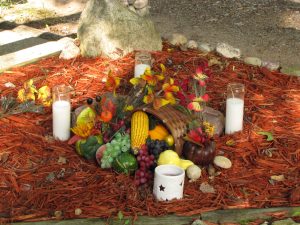Mabon - September 23, 2019
Mabon is a pagan holiday, and one of the eight Wiccan sabbats celebrated during the year. Mabon celebrates the autumnal equinox. In the northern hemisphere, this September 23rd will be the autumnal equinox. However, the southern hemisphere already celebrated Mabon on March 20, when the Northern hemisphere celebrated Ostara. It also celebrates the mid-harvest festival (also known as the second harvest).
Many civilizations have celebrated a harvest festival around the equinox. In the 1700s, the Bavarians (part of present day Germany) began a festival that starts in the last week of September. They called this festival Oktoberfest. The festival had lots of feasting and celebrating. Oktoberfest is still celebrated in Bavaria today.
Many cultures see the second harvest (after the first harvest Lammas) and equinox as a time for giving thanks. This time of year is when farmers know how well their summer crops did, and how well fed their animals have become. This determines whether you and your family would have enough food for the winter. That is why people used to give thanks around this time, thanks for their crops, and animals, and food. The original American Thanksgiving was celebrated on October 3, which makes more sense with harvest times. By the end of November, there’s not that much left to harvest.
The name Mabon comes from the Welsh God, who was the son of the Earth Mother Goddess. However, there is evidence that the name was adopted in the 1970s, and the holiday was not originally a Celtic celebration.
To celebrate this holiday, pagans might pick apples. Apples are a common symbol of the second harvest. They may use the apples in an apple harvest ritual that thanks the gods for the bountiful harvest. Others might perform a ritual to restore balance and harmony to their lives, as this holiday celebrates a day with equal light and day. Another common ritual is to set up an altar with symbols of the season, such as apples, grapes, and other seasonal harvests. Any sabbat would not be complete without a feast for family and friends.
You can learn more about Mabon with these items:



Add a comment to: The Origins and Practices of Mabon